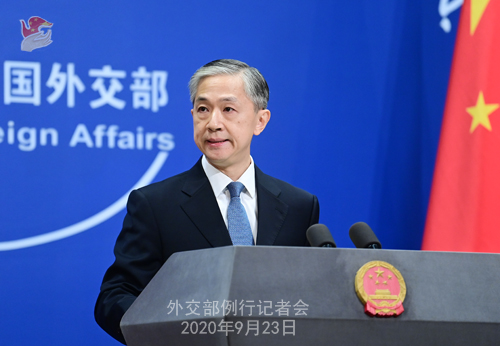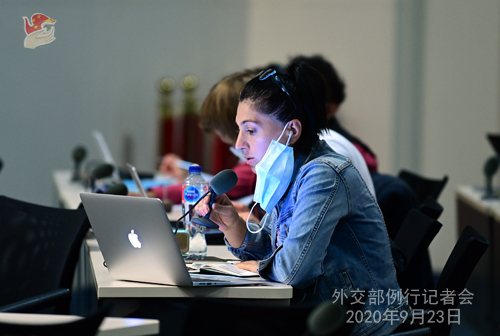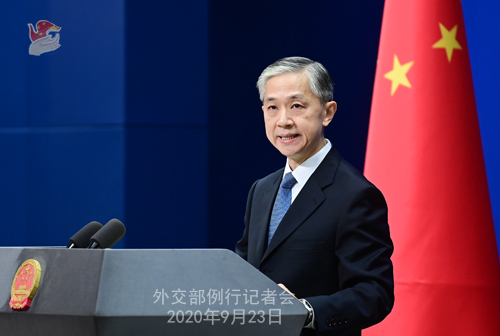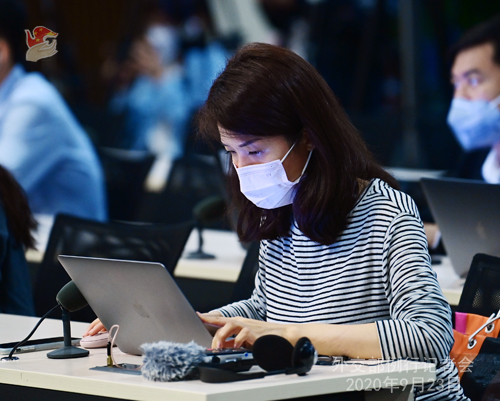| Foreign Ministry Spokesperson Wang Wenbin's Regular Press Conference on September 23, 2020 |
| 2020-09-23 18:50 |
|
I. On September 24, the UN Security Council will hold a video conference of world leaders themed "maintenance of international peace and security: global governance post COVID-19". State Councilor and Foreign Minister Wang Yi will attend the conference as President Xi Jinping's special envoy. II. State Councilor and Foreign Minister Wang Yi will attend via videolink the special meeting of foreign ministers of the Conference on Interaction and Confidence Building Measures in Asia (CICA) on September 24 in Beijing. State Councilor Wang Yi will have in-depth discussions with other heads of delegation on global efforts to fight COVID-19, regional and international situations, CICA cooperation in various fields, among others. Today we have put out a press release responding to the US leader's UNGA remarks about China. The US disregarded facts and fabricated lies. And driven by shady political motives, it used the UN podium to level unfounded accusations against China. China firmly opposes these smears. Such acts have again shown that unilateralism and bullying are the biggest threat to the world. Lies can in no way masquerade as truth. The world is fully aware of China's record in containing COVID-19, and the people have their fair judgment. The coronavirus is the common enemy of humankind. China is a victim of the virus and made its contribution to the global fight against the virus. China reported the epidemic, identified the pathogen and shared its genome sequence with the world all at the earliest time possible. When human-to-human transmission was confirmed, China immediately made the resolute decision to shut all exit routes from Wuhan. The most stringent closure was imposed on the exit routes from Wuhan and Hubei Province and traffic control was put in place. China's customs authorities promptly halted, in accordance with law, overseas travels by Chinese people under four categories, namely confirmed cases, suspected cases, close contacts with the former two and people with fevers. When China closed the exit channels from Wuhan on January 23, only nine confirmed cases were identified outside China, of which only one was in the US. On January 31, the US suspended direct flights with China. And when the US closed its borders to all Chinese citizens on February 2, only a dozen of confirmed cases were reported in the US. China's epidemic response has been open and transparent every step of the way. The time line is clear, and the facts and data speak for themselves. In repeatedly smearing China on COVID-19-related issues, the US is attempting to shift the blame for its bad handling of the virus onto others. This is totally futile. The US also arbitrarily attacked and pulled out of WHO. This has put global anti-epidemic cooperation in jeopardy, which will bring harm to people in the world and incur a heavy cost for the American people. What the US needs to do now is stop the political manipulation, stop labeling or politicizing the virus, and join the rest of the international community in this common fight, rather than scapegoat or smear others. On climate change and environmental protection, the facts are also clear. China has actively fulfilled the international responsibilities consistent with its stage of development and national conditions, and carried out a host of policies and actions. The outcomes achieved are widely recognized. We attained our 2020 climate action targets ahead of schedule, a major contribution to the global response to climate change. Non-fossil fuel now takes up nearly 15 percent in China's total energy consumption. China has 30 percent of the world's installed capacity of renewable energy, accounting for 44 percent of the world increase. Its new energy vehicle stock is more than half the world's total. China has contributed 25 percent to the increased afforestation areas worldwide since 2000. China will update and enhance its nationally determined contribution targets, and introduce stronger policies and measures. We will strive for the peaking of CO2 emissions before 2030 and carbon neutrality before 2060. Such objectives are consistent with China's vision of a vibrant, clean and beautiful world through joint efforts and its commitment to fostering a community with a shared future for humankind. China takes an active part in global climate governance. China is one of the first signatories of the UNFCCC and has contributed significantly to the conclusion of the Kyoto Protocol, the Paris Agreement and related implementation guidelines. Thanks to the concerted efforts by China and other parties, the 2019 UN Climate Change Conference in Madrid produced a string of decisions that reaffirmed the commitment to multilateralism and the consensus among all parties on climate governance, laying the groundwork for follow-up negotiations. In contrast, the United States, as the world's largest emitter of greenhouse gases in cumulative terms, not only failed to ratify the Kyoto Protocol, but also pulled out of the Paris Agreement. It has rejected binding quantified emissions reduction targets for itself and refused to take even the minimum steps to protect the planet. By doing so, the US has completely disassociated itself from the global carbon emissions system and arrangements, and seriously held back such global processes as emissions reduction and green and low-carbon development. The United States is the world's largest exporter of solid waste and a major consumer of plastics per capita. However, it has refused to ratify the Basel Convention and has set obstacles for the global governance process on plastic waste. It has even shipped a huge amount of waste to developing countries, doing enormous harm to the local and global environment. How is such a country in any position to blame China? We urge the US to stop playing political games, abandon unilateralism, and live up to its due responsibility to the world. RIA Novosti: Russian President Putin said at the UN that Russia calls for the conclusion of an agreement to prevent weaponization of outer space that is legally-binding on all major space powers. What's China's comment on this? Wang Wenbin: China and Russia both advocate peaceful uses of outer space and call for efforts to prevent weaponization of and arms race in outer space. The two countries have been promoting for years negotiation on a legally-binding international instrument on outer space arms control to provide a fundamental solution to security issues in outer space. The two have jointly submitted a draft treaty on prevention of an arms race in outer space to the Conference on Disarmament. The proposals are getting more and more support internationally. However, the US, driven by selfish interests, has long been stonewalling international discussions of outer space arms control while vigorously advancing its space dominance strategy. It openly defines outer space a war-fighting domain and put in place a space force and space command, exacerbating the momentum of weaponizing space and turning it into a war-fighting domain. Outer space security bears on the welfare of all humanity. We call on all parties to follow the ideal of building a community with a shared future for mankind, actively promote outer space arms control process, and contribute to lasting peace and shared security in outer space. Xinhua News Agency: Yesterday, President Xi Jinping made a speech at the General Debate of the 75th Session of the United Nations General Assembly, against the background of a complicated international situation and a ravaging COVID-19. What is the key message it sends out? Wang Wenbin: As COVID-19 is still wreaking havoc around the world and the international landscape is experiencing profound and complex changes, President Xi Jinping delivered an important speech yesterday at the General Debate of the 75th Session of the United Nations General Assembly, expounding China's position and propositions on enhancing global cooperation on fighting COVID-19, promoting the world economic recovery and supporting the causes of the United Nations. His speech showcased China's sense of responsibility as a major country to peace and development of mankind and has been warmly received by the international community. As President Xi pointed out, facing the virus, we should put people and life first. No case should be missed and no patient should be left untreated. The spread of the virus must be contained; we should enhance solidarity and get through this together. We should give full play to the leading role of the World Health Organization and launch a joint international response to beat this pandemic; we should adopt comprehensive and long-term control measures. The major economies need to step up macro policy coordination. We should show concern for and accommodate the need of developing countries, especially African countries. The international community needs to take timely and robust measures to ensure the implementation of the 2030 Agenda for Sustainable Development. All these will inject strong impetus into the global anti-pandemic cooperation. President Xi shared his insights into the lessons the pandemic has taught the international community. He said that COVID-19 reminds us that we are living in an interconnected global village with a common stake. We should embrace the vision of a community with a shared future in which everyone is bound together. We should reject attempts to build blocs to keep others out and oppose a zero-sum approach. We should rise above ideological disputes and do not fall into the trap of "clash of civilizations"; economic globalization is an indisputable reality and a historical trend. No one can sever the ties between countries. We should pursue open and inclusive development, remain committed to building an open world economy and say no to unilateralism and protectionism; humankind should launch a green revolution and move faster to create a green way of development and life, preserve the environment and make Mother Earth a better place for all. We should achieve a green recovery of the world economy in the post-COVID era. The global governance system calls for reform and improvement. We should stay true to multilateralism. Global governance should be based on the principle of extensive consultation, joint cooperation and shared benefits. In particular, major countries should act accordingly. They should provide more global public goods. President Xi's insightful analysis demonstrates that China firmly stands on the right side of history and is of significant reference value for the international community. President Xi also announced a series of major measures to support the UN and promote world peace and development, which demonstrates China responsibly fulfilling its major-country role in upholding the values of peace, development, equity, justice, democracy and freedom shared by all and building a new type of international relations and a community with a shared future for mankind.
RIA Novosti: US House of Representatives adopted the Uyghur Forced Labor Prevention Act that bans all goods made with "forced labor" in Xinjiang from being imported to the US. I wonder what is China's comment on this? Wang Wenbin: Neglecting China's stern position and the facts, the US House of Representatives insistently reviewed and adopted the Xinjiang-related bill, which maliciously smears the human rights situation in Xinjiang, hypes up the non-existent "forced labor" and threatens to sanction Chinese entities and individuals. China is strongly indignant and opposed to it. We have lodged stern representations with the US side. Xinjiang affairs are purely China's internal affairs. The US is in no position and has no right to interfere. The issue of "forced labor" is a lie made by some institutions and people of the US and some Western countries. The white paper "Employment and Labor Rights in Xinjiang", recently published by China's State Council Information Office, has an accurate record of the facts in Xinjiang, including the fact that labor and employment policies enacted by the local governments have effectively safeguarded the local people's basic right to employment, which I also elaborated on before. If those in the US truly care for employment and labor rights in Xinjiang, they should take a good look at this white paper. While talking a lot about "caring for" ethnic minorities in Xinjiang, some in the US clearly ignore the major efforts made by the region's local governments to protect human rights and secure employment. They hype up so-called "forced labor" and suppress companies in Xinjiang under such a pretext, which reveals their hypocrisy and hidden intention to contain Xinjiang's growth, sow discord between ethnic groups in China, meddle in China's internal affairs and seek selfish, political gains by playing the China card. However, their despicable attempts will never succeed. We urge the US to grasp the facts and the situation, immediately stop hyping up so-called "forced labor", stop interfering in China's affairs under the pretext of Xinjiang and obstructing China's development, and stop further reviewing and implementing this Xinjiang-related bill. China will continue taking all necessary measures to safeguard Chinese companies' legitimate rights and interests and defend our national sovereignty, security and development interests. The Paper: What's China's expectation on the UNSC virtual meeting of world leaders you just announced? Wang Wenbin: The United Nations is holding a series of high-level meetings on the occasion of its 75th anniversary. In today's world, the global pandemic and the centenary changes are affecting the human society in a profound manner, unilateralism, protectionism and bullying practices are severely undermining the global governance system, and there's stronger voice from the international community on upholding multilateralism and improving global governance. Against this backdrop, it is of positive significance that Niger, as the UNSC's rotating chair in September, proposed this meeting themed "maintenance of international peace and security: global governance post COVID-19" to be held on September 24 via videolink. Taking it as an opportunity, we hope all sides can cooperate in handling the virus and have in-depth discussions on global governance to better deal with global challenges. China will actively participate in this meeting, work with other UNSC members to achieve positive outcomes and send out a united, concerted and strong signal of upholding multilateralism and strengthening the role of the UN. NHK: President Xi Jinping said at the UNGA General Debate that China will achieve carbon neutrality by 2060. What's the significance of doing that? Wang Wenbin: I've just talked about China's relevant proposals and propositions as expounded by President Xi Jinping in his speech at the UNGA General Debate. I would like to reiterate that the Chinese government attaches great importance to environmental protection. We have included ecological civilization as one prong of the "five-pronged" overall plan for developing socialism with Chinese characteristics, made earnest efforts to pursue green, low-carbon and sustainable development, and faithfully fulfilled our obligations under relevant international treaties in such fields as climate change, biodiversity and chemical use. Such efforts have led to positive outcomes. By the end of 2019, China has reduced carbon dioxide emissions per unit of GDP by 48.1 percent over 2005, already exceeding the 2030 target for forest carbon sinks. China has taken real actions and made real contributions to the global climate and environment governance. As announced by President Xi yesterday, China will scale up its Intended Nationally Determined Contributions by adopting more vigorous policies and measures. We aim to have CO2 emissions peak before 2030 and achieve carbon neutrality before 2060. These ambitious goals speak to China's role and sense of responsibility as a major country in protecting the environment and tackling climate change. They are also powerful rebuke to the US unfounded accusations against China at the UNGA.
Shenzhen TV: Canadian ambassador to China Dominic Barton said at a Canada-China economic policy forum hosted by the University of Alberta that "The weight of the world is shifting and has shifted toward Asia, so we need to do more in China". China is going to play a more profound role and there is a potential for the two countries to do a lot together. What's China's response? Wang Wenbin: We note Ambassador Barton's remarks. This year marks the 50th anniversary of the establishment of diplomatic relations between China and Canada. The half a century's journey has shown that a sound and steady relationship serves the common interests of both peoples. And only when the principle of mutual respect and equality is earnestly upheld can bilateral relations enjoy steady and sustained development. The current difficulties in China-Canada relations are not something we wish to see. We urge the Canadian side to work towards the same goal with China and make concrete efforts to bring relations back onto the right track. Beijing Youth Daily: White House National Security Adviser Robert O'Brien in a recent article carried by the Wall Street Journal alleged that China is interfering in the US presidential election by cyber and other means. Would you like to respond to this? Wang Wenbin: The allegation from the US side is purely malicious groundless smearing. China firmly rejects it. We are committed to the principle of non-interference. We are not interested and have never interfered in the US presidential election. On the contrary, the world sees clearly who has been wantonly meddling in other countries' domestic affairs. We urge the US side to stop playing the trick of feigning innocence and calling others thief, stop interfering in China's internal affairs and stop its groundless accusations and smears against China. CNR: What's China's expectation on the CICA special meeting of foreign ministers to be held tomorrow? Wang Wenbin: CICA is a security forum that covers more areas and has more members and greater representation than any other in Asia. Since its founding, CICA has been committed to the historical trend of peace and development, strengthening mutual trust and coordination between countries, and contributing to peace and development in Asia. Faced with the centenary changes and the global pandemic, regional countries all face the common mission to safeguard security and stability, enhance epidemic prevention and control, and boost economic recovery. Through this foreign ministers' meeting, China hopes all sides can fully leverage the role of CICA, continue advancing international cooperation to fight the virus, help all countries to resume economic and social development, deal with risks and challenges together, firmly practice multilateralism, and contribute to building an open, inclusive, innovative and prosperous Asia where countries enjoy mutual respect, trust, security and cooperation.
|
| |||||||||||||||
|
|||||||||||||||





